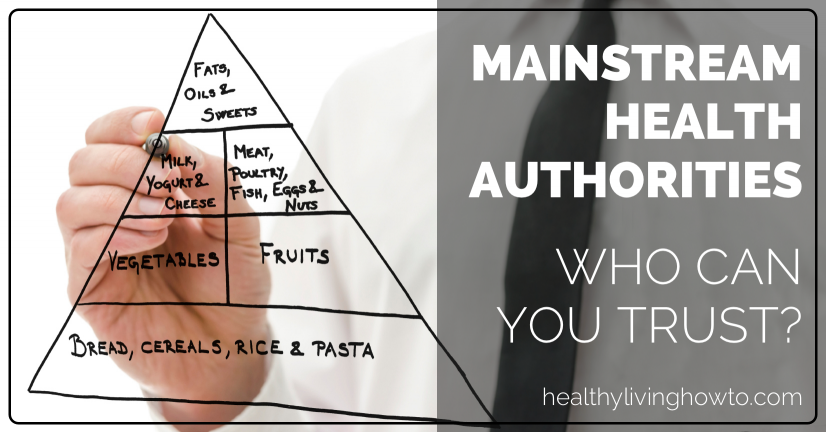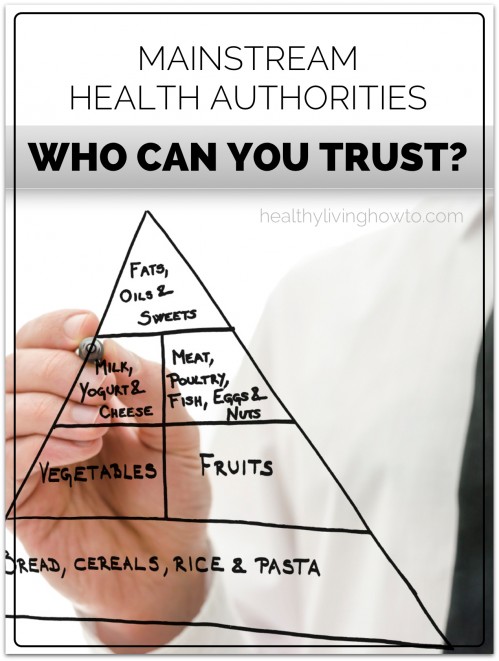The mainstream health authorities have an excellent track record of getting things wrong. Since the failed low-fat diet was born in 1977, rates of obesity and diabetes have skyrocketed. New evidence shows that this advice is not only ineffective, but downright harmful for a lot of people. However, despite the studies piling up, the major organizations and their guidelines show no signs of being about to change. Here are 6 reasons why I do not trust the mainstream health authorities.
1. Many of Them Are Sponsored by The Big Junk Food Companies
In a perfect world, the people in charge of setting dietary guidelines and educating future and current nutrition professionals would be objective. They would let current science guide their way, not old dogmas, political pressure or financial influences.
However, we do not live in a perfect world. We live in a world that is dominated by money and major corporations exert their influences everywhere, including the health organizations that are supposed to be in charge of protecting our health.
The best example of this is the Academy of Nutrition and Dietetics, the “world’s largest organization of food and nutrition professionals” (formerly known as the ADA – American Dietetic Association).
This organization licenses and educates registered dietitians, the people who are supposed to be the ultimate authorities of what to eat to be healthy. However, this organization is heavily sponsored by junk food companies.
Here are some of the Academy’s most “loyal” corporate sponsors:

You don’t need to take my word for it… this information is available right here on the Academy’s official website!
Big junk food companies like Coca Cola, Pepsico and Mars are paying large sums of money to Academy. They even provide educational courses to registered dietitians, where they “inform” them that sugar is okay for children.
To read more, check out this shocking report of the financial ties between this highly influential nutrition organization and the companies that produce disease promoting foods.
I don’t know about you, but I would not trust dietary advice from anyone who has ever been sponsored or educated by the likes of Coca Cola.
I should point out that many registered dietitians seriously object to these conflicts of interest. If you want to support them, you can join them on their Facebook page: Dietitians For Professional Integrity.
2. They Still Say That Saturated Fat Causes Heart Disease
Back in the early 20th century, there was a major epidemic of heart disease in America. A few very influential scientists were convinced that saturated fat was a leading cause, raising cholesterol in the blood and contributing to heart attacks. This hypothesis, known as the “diet-heart hypothesis”, has been the cornerstone of dietary recommendations since then.
This is the reason we’ve all been told to eat less meat and fat, while increasing our intake of high carb foods like grains.
However, this hypothesis was based on very weak evidence and has now been thoroughly disproven. In recent years and decades, many large studies have been conducted examining this relationship.
One massive review looked at data from 21 prospective studies with a total of 347,747 participants and concluded that there is no association between saturated fat and the risk of heart disease (1).
Multiple other studies agree with these findings (2, 3).
The truth is that saturated fat actually raises HDL (the “good” cholesterol), which is associated with a reduced risk of heart disease (4, 5).
Saturated fat also changes the LDL (the “bad” cholesterol) from small, dense LDL (very, very bad) to large LDL – which is benign (6, 7, 8).
The idea that saturated fat causes heart disease was a myth all along. However, the major health organizations still say that we should reduce our consumption despite zero evidence of it actually being effective.
3. The Ones Who Aren’t Sponsored by Food Companies Are Sponsored by Drug Companies
The junk food companies aren’t the only ones that profit when people eat disease promoting foods. No, the ones who stand to profit the most are the drug companies. When more people are sick, these companies can sell more drugs. That’s how they make money.
One of the most horrifying and most rapidly advancing diseases of our times is type II diabetes, which currently afflicts over 300 million people worldwide.
Type II diabetes is mainly caused by a bad diet and travels with other lifestyle-related diseases like metabolic syndrome and obesity.
This disease is almost completely preventable. Populations that don’t have the western junk food diet don’t have this disease.
In America, we have the American Diabetes Association. This is the major organization that is dedicated to the fight against diabetes (or so they say). Their stated purpose is to deliver services, fund research and provide objective, evidence-based information. However, their dietary advice doesn’t really reflect their purpose.
The ADA recommends that diabetics eat a low-fat, high-carb diet. Anyone with even a basic understanding of biochemistry will understand that this is a complete disaster for diabetics. Diabetics can’t handle all the glucose from these carbohydrates, requiring them to take drugs to bring their blood glucose down.
Let’s see which wonderful drug companies pay for this excellent advice…
- Abbott Laboratories – 675,741$
- Amylin Pharmaceuticals – 502,235$
- BD Diabetes Care – 526,704$
- Boehringer-Ingelheim Pharmaceuticals – 1,115,827$
- Eli Lilly and Company – 2,436,840$
- Merck – 1,118,925$
- Pfizer – 185,073$
… and more. The drug companies gave a sum total of 15 million dollars to the ADA in the year 2011 alone!
Don’t believe me? Again, this information is available right here, on their official website.
It goes something like this:
- The drug companies pay lots of money to the ADA.
- The ADA tells diabetics to eat a low-fat, high-carb diet.
- The diabetics follow their advice and need massive amounts of drugs to keep their blood glucose down.
- The drug companies make their money back thousandfold.
Honestly, I’m not the kind of guy who believes in conspiracy theories.
However, given the immense amount of evidence against high-carb diets for diabetics and the fact that they just don’t make biochemical sense, this is the only explanation I can think of.
Take note that these drugs do NOT cure type II diabetes, they just mask the symptoms. These people will still age faster, become blind, require an amputation or die prematurely from heart disease.
Taking money from drug companies and then recommending a high-carb diet to diabetics is a crime against humanity in my opinion, especially when there is another solution that is FREE and scientifically proven to work MUCH better.
Click Here to Pin
4. They Say That Everyone Should Eat a Low-Fat, High-Carb Diet
Mainstream nutrition likes to preach a one-size-fits-all solution. This solution is the low-fat, high-carb diet that has been recommended to everyone since the year 1977.
All the major health organizations seem to agree that this type of diet is optimal for humans.
This diet involves eating carbs as 50-60% of calories, with fat under 30% of calories, protein making up the rest.
On this diet, people are instructed to eat less cholesterol, less saturated fat and less sodium. They also recommend that we restrict sugar, although not as enthusiastically as they warn us about those “dangerous” fats. People are encouraged to increase their intake of fruits, vegetables, whole grains, vegetable oils and eat fish, lean meats and low-fat dairy products.
Given the that all the major health organizations promote this diet, you would think that there was some seriously strong evidence demonstrating its effectiveness.
Alas, no.
Research on the low-fat diet has received massive amounts of funding and many large, long-term randomized controlled trials have been conducted. Unfortunately, the studies all point to the same conclusion… this diet does NOT work. At all.
The Women’s Health Initiative, the largest randomized controlled trial on diet ever conducted, split 48,835 women into two groups. One group was instructed to eat a low-fat diet, the other continued to eat the standard western junk food diet.
After a period of 7.5 years, the low-fat group weighed only 0.4 kg (1 lb!) less than the control group and there was no difference in the rate of heart disease or cancer (9, 10, 11, 12).
Put simply, the diet was 100% ineffective.
Other massive controlled trials such as the MRFIT study, as well as the Look AHEAD trial, show that this diet does not prevent heart disease at all (13, 14).
The low-fat diet got tested, it didn’t work. Period.
5. They Actively Discourage People From Diets That Are Proven to Work
I personally think that low-carb diets are a potential cure to some of the world’s biggest health problems. Since the year 2002, over 20 randomized controlled trials have compared low-carb diets to the standard of care, the calorie restricted low-fat diet.
Almost all of these studies lead to the same conclusions.
Low-Carb Diets:
- Lead to more weight loss and greater reductions in body fat, even when the low-carb dieters are allowed to eat a much as they want (15, 16).
- Cause powerful reductions in blood pressure (17, 18).
- Lower triglycerides much more (19, 20).
- Lower blood sugar levels and improve symptoms of diabetes (21, 22).
- Raise HDL (the good cholesterol) much more (23, 24).
- Change the pattern of LDL cholesterol from small, dense (very bad) to Large LDL – which is benign (25, 26).
- If anything, low-carb diets are also easier to stick to, probably because people don’t need to count calories and be hungry for the diet to work (27).
Despite over a decade of evidence in favor of low-carb diets, the health authorities still have the audacity to claim that such diets are dangerous, then continue to peddle the failed low-fat nonsense that is hurting more people than it helps.
6. They Base Their Recommendations on Outdated Science
I used to believe that the health organizations based their recommendations on the latest science. However, when I started digging into the literature myself, I realized that their advice is often the exact opposite of what the studies show.
Some examples:
- “Sugar is just empty calories” – This is completely false, the harmful effects of sugar go way beyond empty calories (28, 29).
- “Only people with celiac disease should avoid gluten” – This is not true, evidence is mounting that a significant part of the population has adverse reactions to gluten (30, 31, 32).
- “Everyone should cut back on sodium” – While it is true that sodium restriction mildly reduces blood pressure, studies show that this has zero effect on mortality (33, 34, 35).
Unfortunately, this is just the tip of the iceberg. There are many more ridiculous myths in mainstream nutrition that have been thoroughly proven to be false.

